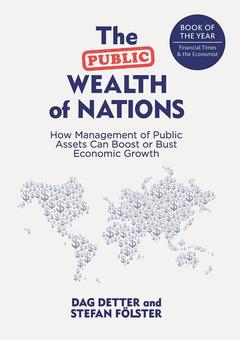Description
The Public Wealth of Nations, 2015
How Management of Public Assets Can Boost or Bust Economic Growth
Authors: Detter Dag, Fölster Stefan
Language: English
Subjects for The Public Wealth of Nations:
Keywords
Wealth; Nations; Assets; Economy; economic growth; growth; management; Wealth of Nations
31.64 €
In Print (Delivery period: 15 days).
Add to cartPublication date: 09-2017
Support: Print on demand
Publication date: 06-2015
230 p. · 14x21.6 cm · Hardback
Description
/li>Contents
/li>Biography
/li>Comment
/li>
We have spent the last three decades engaged in a pointless and irrelevant debate about the relative merits of privatization or nationalization. We have been arguing about the wrong thing while sitting on a goldmine of assets.
Don?t worry about who owns those assets, worry about whether they are managed effectively.
Why does this matter? Because despite the Thatcher/ Reagan economic revolution, the largest pool of wealth in the world ? a global total that is much larger than the world?s total pensions savings, and ten times the total of all the sovereign wealth funds on the planet ? is still comprised of commercial assets that are held in public ownership. If professionally managed, they could generate an annual yield of 2.7 trillion dollars, more than current global spending on infrastructure: transport, power, water, and communications.
Based on both economic research and hands-on experience from many countries, the authors argue that publicly owned commercial assets need to be taken out of the direct and distorting control of politicians and placed under professional management in a ?National Wealth Fund? or its local government equivalent. Such a move would trigger much-needed structural reforms in national economies, thus resurrect strained government finances, bolster ailing economic growth, and improve the fabric of democratic institutions.
This radical, reforming book was named one of the "Books of the Year".by both the FT and The Economist.
Stefan Fölster is The Managing Director of the Reform Institute (a market-oriented think tank in Stockholm with a focus on innovative reforms). He was previously the Chief Economist for the Confederation of Swedish Enterprise. He has authored many articles and books, for example the recent Renaissance of Reforms published jointly by the IEA and Timbro.
A genuinely new idea backed by solid evidence
The first ever reliable estimate of the value of the world's publically held commercial assets




